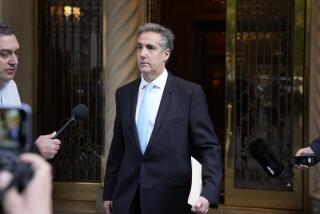Cohen Eases Off Talk of Bosnia Exit
- Share via
WASHINGTON — Defense Secretary William S. Cohen on Sunday eased off slightly from his earlier assertion that U.S troops would exit Bosnia by mid-1998, saying, “I believe we will be out in 18 months” but stopping short of an unequivocal withdrawal commitment.
Cohen said that when U.S. forces were sent on their peacekeeping mission to the Balkan country in December 1995, “we indicated very clearly that this was a commitment that was short-term in duration.”
Since the arrival of the peacekeeping forces, the war has ended and Bosnians are no longer being killed, Cohen said on ABC-TV’s “This Week.”
“But we are not going to maintain a longer-term commitment to that region,” he said. “President Clinton has said another 18 months, and I believe we will be out in 18 months.”
On Wednesday, just before the Senate voted unanimously to confirm his nomination as Defense secretary, Cohen made what appeared to be an ironclad pledge that U.S. troops would be withdrawn by the end of June 1998.
“We are not going to be there. This is going to end at that point,” he told his former colleagues on the Senate Armed Services Committee.
The following day, in response to requests for clarification, the Pentagon described the mid-1998 departure date as a “goal.”
On other topics, Cohen left open the possibility that the Pentagon’s “don’t ask, don’t tell” policy toward gay and lesbian service members would change as time passes.
Cohen, who voted for the policy in 1993, said he thought “under the circumstances, this was arrived at as a fair policy. And I think if it evolves over a period of time, we’ll wait and see. But right now it’s the policy and ought to be adhered to.”
Cohen also defended the rules against women serving in many combat situations.
“We’re talking about war, and we’re also talking about societal norms,” he said. “And society has approved of where we are today, and I think we’re at the right place. If it evolves in the future, we’ll wait and see.”
Cohen said 13% of military personnel are women, compared with 2.5% in 1973. He said 99% of Air Force billets and 80% of Army billets are open to women.
Asked whether the Pentagon’s $260-billion budget is justified, Cohen said Russia’s nuclear inventory of 20,000 to 30,000 missiles is “something for us to be concerned about.” Also of concern, he said, are China’s growth as a regional power, “what’s taking place in North Korea” and the military strength of Iran and Iraq.
Cohen also urged the Senate to ratify an international treaty banning chemical weapons, despite the apparent unwillingness of the Russians and Chinese to go along.
He said the United States committed itself during the Reagan administration to eliminating chemical weapons by 2004. Also, joining the international convention would give the United States a say in administering the program and conducting inspections in participating countries, he said.
*
Also Sunday, Secretary of State Madeleine Albright toned down Clinton administration complaints about Saudi Arabia’s lack of cooperation in the investigation of the June bombing of the U.S. barracks in Dhahran that killed 19 service personnel.
Last week, FBI Director Louis J. Freeh and Atty. Gen. Janet Reno publicly complained that the Saudi government had not shared information with U.S. investigators.
But Albright said on NBC-TV’s “Meet the Press” that “the Saudis have been cooperative, but Mr. Freeh has asked for additional information. The Saudis have assured us at the highest levels that they will be cooperative, and we expect them to be cooperative.”
More to Read
Sign up for Essential California
The most important California stories and recommendations in your inbox every morning.
You may occasionally receive promotional content from the Los Angeles Times.










